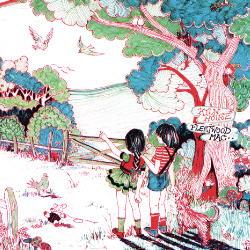 Fleetwood Mac Kiln House is probably one of the least pretentious albums ever made, and it's the one Fleetwood Mac album I'd rather listen to if asked to listen to a Fleetwood Mac album. "So, what'll it be, Rumours?" "Nope, give me Kiln House, thanks." I'm not sure what sort of bar this scene is supposed to take place in, but there you have it. Recorded in 1970 as the follow-up to Then Play On (another great Fleetwood Mac album that isn't Rumours), Kiln House was the product of the group's first big line-up change – founder and principal songwriter Peter Green had left to join a cult (no kidding), leaving the songwriting to guitarists Danny Kirwan and Jeremy Spencer. John McVie and Mick Fleetwood, of course, comprised the rhythm section. The result veered away from Fleetwood Mac's "classic" (crappy) blues-rock and into a totally anachronistic rockabilly/country sound that is otherwise entirely nonexistent in the band's catalog. That may be the reason I love Kiln House most of all, because even among Fleetwood Mac's great albums (and they made a bunch of them), Kiln House always offers surprises. It's a tremendously underrated album, probably because it's completely unambitious. "This is the Rock" opens the album in a sort of quasi-Elvis mode, more along the lines of what the Cramps would sound like if they were forced to drop the sneering art-school "hipness." "Station Man" is track two, a not-unlike-the-Grateful-Dead kind of tune that is considered to be the album's "big track" (I think this is the one track from Kiln House anthologized on the box set). It's a great song, but not even the album's best moment – that would be "One Together," a very stark, very pretty, very simple ballad that would almost seem stupid if it weren't so sincere. This song is bound to be discovered by someone and turned into a huge hit sometime. I've never understood why no one ever names this to their top songs of all time lists, especially the British press – this one's right up their alley. Makes "Man of the World" seem like "Helter Skelter." Kiln House sounds like it was cranked out over a few days, in someone's home studio. The arrangements don't stray too much – it's basically guitar, fuzz guitar, bass, drums and vocals, with occasional acoustic guitar and piano. Christine Perfect (yet to be McVie) sings backup on a coupe tracks, marking her unofficial induction into Fleetwood Mac. The remaining songs are all memorable and happy, fueled by what I can only pinpoint as naievty. "Buddy's Song" is a Buddy Holly homage done with utter reverence. "Hi Ho Silver" is a rave-up that most garage bands of the era would have thought too cheesy to even try, but it works, bouyed by the line "Don't make me nervous, I'm holding a baseball bat." Take that, Ramones. "Blood on the Floor" is a hysterical mock country song about a guy who's in jail because he shot his sweetheart, but he's only regretful that he's in jail. "Earl Gray" is a moody instrumental, very nice. "Jewel Eyed Judy" is another rocker, well done. The album closes with "Tell Me All the Things You Do" and "Mission Bell," the former a bluesy workout augmented by electric piano and wah-wah guitar, the latter a hippie throwback that is a perfect cap to the retro feel of the album. It's refreshing even though your typical 16-year old nowadays would do nothing but fidget through it. That could be said of the album, but in some ways, making a 2003 teenager fidget is probably a good quality for an album to have. A beautiful record, worthy of much more attention.
Review by Tula Greene |